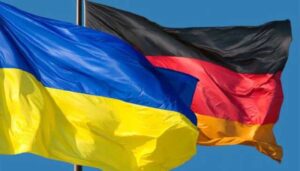
Defense Minister Oleksiy Reznikov discussed with German Defense Minister Christine Lambrecht a package of military assistance to Ukraine from Germany.
“We had a productive meeting of the VTC with German Federal Minister of Defense Christine Lambrecht. We discussed the essence of the upcoming security assistance package from Germany to Ukraine. I look forward to the promised support. Thank you for staying with Ukraine,” Reznikov wrote on Twitter on Friday night .
Internal and external debt of Ukraine in 2009-2022

SSC of Ukraine

An expert group prepared by WHO intends to conduct a thorough analysis of the origin of the coronavirus, the Associated Press (AP) reported on Thursday.
“Further research is needed to determine how COVID-19 spread from the very beginning, including a more detailed analysis of the possibility of an abnormal situation in the laboratory,” the AP quotes excerpts from the report of the expert group.
The agency recalls that last year the US Department of Health announced that there was an extremely small possibility of the spread of COVID-19 among people due to a leak from the laboratory.
“Basic data to explain the emergence of the pandemic is still missing. Scientists said the group is open to any scientific evidence available to comprehensively explore all reasonable hypotheses,” the report says.
Infection with the coronavirus COVID-19 was first detected in the Chinese city of Wuhan in Hubei province at the end of 2019, then it began to spread around the world. On March 11, 2020, the WHO declared the coronavirus a pandemic.
By early April 2020, WHO reported that the number of cases of COVID-19 infection worldwide exceeded 1 million. By mid-October 2021, almost 240 million cases of infection had been registered worldwide.
Most scientists initially believed that COVID-19 was a virus of zoonotic origin. It is assumed that it could be transmitted to humans from bats. To determine the source of origin of the coronavirus, WHO initiated a special investigation. To this end, in early February 2021, a team of WHO experts visited the Wuhan Institute of Virology and, following the visit, concluded that a leak of viruses from the laboratory of the institute was “highly unlikely”. Many Western countries did not agree with the results of this investigation.
China has repeatedly opposed calls by WHO to conduct additional investigations in the country to determine the source of the origin of COVID-19.

The Eurocar plant (Solomonovo, Zakarpattia region) will resume the SKD assembly of Skoda cars from June 10, which was suspended with the start of Russia’s military aggression in Ukraine, the company’s press service reports.
“Skoda AUTO resumes deliveries of Skoda cars to Ukraine in the SKD format. The first batch – 80 models of KODIAQ and KAROQ crossovers has already been shipped, and from June 10 the plant resumes operation,” the company’s Facebook page says.
The company notes that the growth in production will directly depend on the development of the war in Ukraine. The vacant premises of the plant will continue to serve as a center for temporary displaced persons.
The message reminds that SKD assembly (Semi Knocked Down) means that the power unit (engine, gearbox, front axle), rear axle, wheels, exhaust, and driveshaft for 4×4 models are dismantled from finished cars. The main components, together with the body, are sent for reassembly to a factory in Ukraine.
The company also reminds that a stable supply of original spare parts, accessories and engine oils to Skoda service centers in Ukraine has already been established.
The Eurocar plant, which is part of the Atoll Holding group of companies, the official manufacturer of Skoda cars in Ukraine, began producing cars in 2001, investments in its creation amounted to $ 250 million. Capacities for small-scale assembly of cars were created, buildings for welding and painting shops were built.

Up to 80% hemostatic tourniquets supplied to the Ukrainian army are of poor quality, head of COR-Medical Tigran Amalyan has said.
“I think the most acute problem concerning both the Armed Forces of Ukraine and the healthcare system is a large number of poor quality tourniquets. We have conducted a research, we worked with military doctors, and we think up to 80% of tourniquets supplied to our army today are of poor quality,” he told a press conference in Kyiv on Thursday.
Amalyan said that one of the reasons why such a huge amount of poor quality tourniquets is supplied was the fact that the military do not check them on their own.
“The military want to take them without checking and then, in case of an injury, when they use them, tourniquets often crack. We even had to post several videos on our channel. We must inform all military that they should check tourniquets on their own,” he said.
Amalyan also noted that there are no protocols of transfer from civilian to military medicine in the country.
He also pointed at the fact that “a lot of highly qualified Ukrainian doctors, who should had been trained for dozens of years, have been simply transferred to the frontline. I know that several very serious specialists were killed on the battlefield. And they were among a few specialists of such a high level in the world.”

The National Bank of Sweden and the National Bank of Ukraine (NBU) will launch a program for Ukrainian refugees to exchange hryvnia cash for Swedish krona approximately from June 15, the NBU press service reported on Thursday.
According to the report, adult Ukrainians registered in Sweden will be able to exchange hryvnia in 53 branches of the Forex company in the amount of up to UAH 10,000 per person.
Denominations of UAH 100, UAH 200, UAH 500 and UAH 1,000 will be accepted for exchange.
As reported, Germany from May 24, and Belgium from June 1 launched a program for exchanging cash hryvnia for euros.